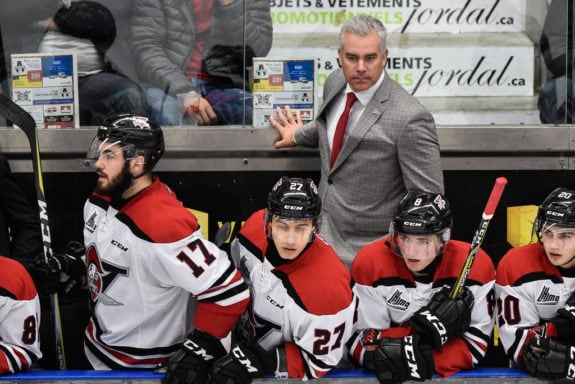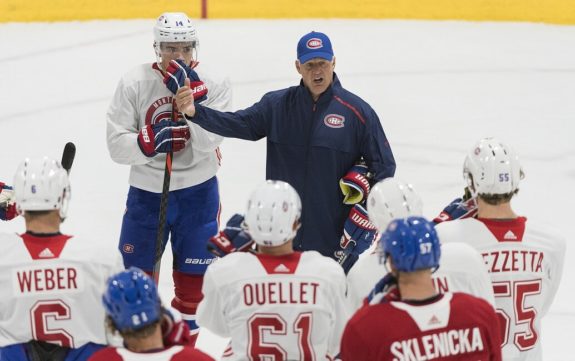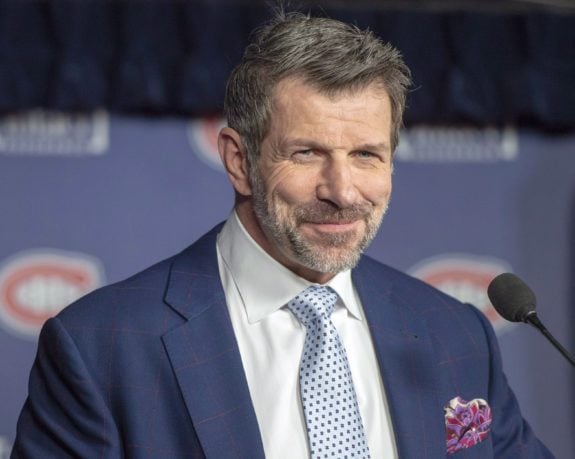New Montreal Canadiens head coach Dominique Ducharme clearly has some work to do based on his debut. The 6-3 loss to the Winnipeg Jets, in which the Habs led 3-1, only served to justify general manager Marc Bergevin’s decision to move on from Ducharme’s predecessor, Claude Julien.
Ducharme Loses Debut to Jets
Granted, it would have made better headlines had the Canadiens pulled out the victory, but the narrative that a coaching change guarantees a victory the first time out isn’t necessarily true. For example, there were eight in-season coaching changes in 2019-20, resulting in a 4-4 overall record in the new hires’ first games.

What’s perhaps more significant is five of the eight teams ended the regular season as top-eight seeds in their respective conferences. Of the three teams that didn’t, the Minnesota Wild (Bruce Boudreau to Dean Evason), who reached the play-in round, and New Jersey Devils (John Hynes to Alain Nasreddine) nevertheless improved in terms of points percentage by the end of the season. Only the San Jose Sharks (Peter DeBoer to Bob Boughner) failed to gain ground in that respect.
More to the point, the Wild and the Devils had each lost those first games (in addition to the Sharks). Perhaps most significantly to the Canadiens though, the Stars (who maintained the same points-percentage pace under both Jim Montgomery and successor Rick Bowness), reached the Stanley Cup Final.
While the Stars won in Bowness’ debut, the Canadiens can maybe find inspiration in the Pittsburgh Penguins instead who have gone on to win the Stanley Cup several times the same campaign as a mid-season coaching change. Most recently, the Penguins won after Mike Sullivan took over for Mike Johnston during the 2015-16 season (loss in Sullivan’s first game).
Also of note, Dan Bylsma went on to win the Stanley Cup in 2009, after Michel Therrien had been relieved of his duties. Bylsma also suffered a loss in his debut. The lesson here is clear: It pays to employ the services of Sidney Crosby and Evgeni Malkin.
Julien Fails to Live Up to Promise
Ideally, the Canadiens’ last coaching change, when Julien took over Therrien in the middle of the 2016-17 season, the second time in history the former has replaced the latter, would have had the same effect. Unfortunately, the Canadiens, who did improve in the standings under Julien the rest of the regular season to capture the Atlantic Division championship, got upset in embarrassing fashion by the New York Rangers in the first round.

This all proves two things. Firstly, it’s a breath of fresh air for Bergevin not to recycle an old Canadiens head coach who has failed in the past, going with a relative newcomer in Ducharme, Julien’s former assistant, instead. Secondly, with the Canadiens still technically a playoff team (even if in name only based on their current 2-5-2 swoon), their destiny is still in their hands and the season is fully salvageable.
However, something had to change. The Habs’ realistic playoff hopes were far from sustainable based on their recent level of play. The Canadiens’ performance since their week off has been most telling. Despite going into their break on a high with a comeback victory over the Toronto Maple Leafs, they lost to those same Leafs in their first game back in which the Habs did seem to have their legs under them, but nevertheless lacked discipline, giving up three power-play goals on four chances (to the one power-play chance the Canadiens got in the game).
The penalty kill itself has been bad enough this season (a 22nd-ranked 76.3%), but the Habs’ lack of discipline has arguably been the bigger problem. The Habs have far and away the worst differential in penalties in the league (-17, with the second-to-last-place Washington Capital owning a -12 rating).
The Canadiens have undeniably been on the receiving end of a few bad calls, but that’s arguably true of any team. There comes a point where you have to look in the mirror and call a spade a spade. The Canadiens are to blame for their recent woes and no one else.
Case in point, the Habs then lost two straight games in extra time to the last-place Ottawa Senators. Ahead of the second, a 5-4 shootout loss, Julien had been asked during a media-availability session about what the Canadiens needed to do to set the tone after the first defeat 48 hours earlier. Getting outplayed early on wasn’t part of the strategy, or at least it shouldn’t have been, with captain Shea Weber saying after the second loss: “We definitely had a slow start. They came out jumping and we were kind of sitting back… For whatever reason, you can’t get it going.”
It wasn’t about Weber throwing Julien under the bus by any stretch. He was just being honest. However, it speaks volumes about an apparent lack of motivation heading in, which would fall under the responsibility of the head coach. The Canadiens have now lost three of four to the Senators, which is unacceptable considering all of the Habs’ games are intra-divisional and mean so much more.
Bergevin Hitches Wagon to Ducharme
For a team that had serious playoff aspirations this shortened 56-game season, Bergevin must have felt like he had to do something. Truth be told, he didn’t necessarily in order to save himself after an impressive offseason performance on his part. In fact, in many ways, it would have made sense for Bergevin to wait as long as possible to reassess the situation, even until next offseason, when more candidates may become available.
Now there are no guarantees Bergevin picked the right man for the job, although Ducharme’s winning pedigree up to this point is at least an indication he deserves a shot. By telling the media at Ducharme’s introductory press conference as interim head coach that the permanent job was his to lose, Bergevin effectively put himself under the gun as well, by hiring his third head coach. Officially, he hasn’t, but Bergevin did say “quarantine or no quarantine, Dominique Ducharme was my guy.” That’s now on the record.
Many general managers do not get three shots to find their guy. So, there’s a case to be made Bergevin is hitching himself to Ducharme’s wagon and it’s not just by all appearances. If Bergevin has to resort to hiring someone else next offseason, it will mean Ducharme wasn’t the right guy after all, making Bergevin an abject failure, with selecting coaches being one of the primary responsibilities of a GM.

By now, Bergevin is likely safe until the end of his contract in 2022. The fact that he hasn’t been fired yet despite almost missing the playoffs in four of the last five seasons is circumstantial evidence owner Geoff Molson won’t, especially with only one season left after this one. However, that doesn’t mean Molson has to extend him.
There would be no reason why Molson should either, if the Habs fail to develop into at least contenders by then. It would be 10 years that Bergevin’s on the job, the end of his second five-year plan for all intents and purposes.
It cannot be denied that, by firing Julien when he did, even if he didn’t technically have to, Bergevin was only doing his job, trying to ensure his team’s on-ice performance meets expectations. Sure, he’s putting the team’s interests ahead of his own, but that’s essentially what he’s been empowered to do all this time. However, Bergevin could have simply committed to leaving the interim label on Ducharme’s title for now, saying he would revisit the decision at the end of the season.
In such a hypothetical scenario, all Bergevin would have been doing was his due diligence, making a coaching change that by all accounts had to be made in order to salvage the season. Instead, Bergevin admirably went the extra mile, placing his confidence both in Ducharme and the moves he himself made last offseason that until recently had been earning rave reviews.
In many ways, Bergevin is betting on himself here and, if you’re going to go out, that’s probably the way to do it. What’s truly significant though is, after literally years of disappointment on the part of the Canadiens under his management, it’s at least encouraging that he and the fans calling for higher standards are on the same page.
Trading for Crosby and Malkin probably isn’t in the cards. However, a turnaround of some measure realistically is, based on how well the Habs had been playing earlier this season with this same lineup. In that respect, Ducharme should have all the pieces he needs, but the job ahead of him is far from easy. From Bergevin’s vantage point, the heavy lifting may be done for the most part, but the load Ducharme is now carrying is far from his own. Bergevin now shoulders all the responsibility for how this season pans out, for better or worse. That in itself is a notable turnaround in its own right.